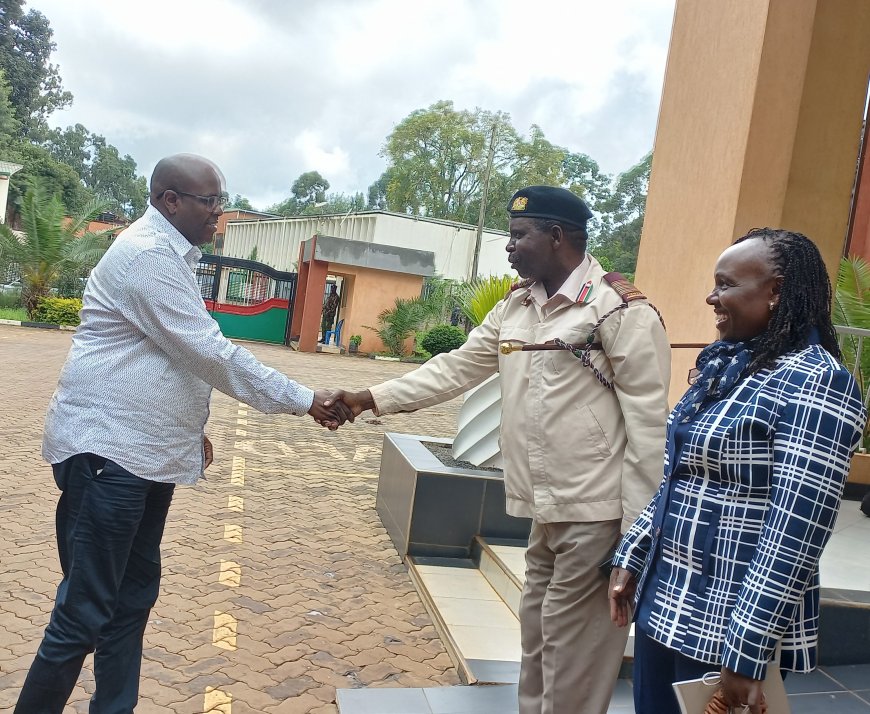Mainstreaming productivity training to improve the country’s economy

Kiambu,
Tuesday November 21, 2023
KNA Wangari Ndirangu
The government has been undertaking productivity mainstreaming training programme in various institutions in order to enhance productivity.
The programme is one of the performance targets that have been set for Ministries, Departments and Agencies (MDAs) across the Country informing the training which is being undertaken across the country for a period of 3 weeks from 20th Nov to 8th Dec. 2023.
The National Productivity and Competitiveness Centre (NPCC) in the State Department for Labour and Skills Development, Ministry of Labour and Social protection has kicked off the trainings and the implementation is one of the targets in the 20th cycle of the public sector Performance Contracting (PC) 2023/24 financial year.
Speaking today when he officially opened a productivity mainstreaming training for the lower central region at Kiambu Institute of Science and Technology (KIST), Principal Secretary in the Cabinet Office Dr. Idris Salim Dokota said the training will not only enhance productivity in the public sector but the gains are expected to enable the economy produce more for the same number of inputs.
“The ballooning wage bill currently stands at 46 percent of the ordinary revenue against the recommended 35 percent thus exerting pressure on Government expenditure. This training therefore forms a critical part of public sector reforms and is geared towards operational efficiency, labour efficiency and customer satisfaction”, he said.
Dr. Dokota added that in order to address the wage bill challenge the productivity enhancement in the public sector is one of the measures that the government has put in place and thus the participation from the various institutions in the training will enhance productivity in their respective MDAs.
“The Kenya Vision 2030 recognizes that Kenya's main potential lies in its people, that is, we are talking about their creativity, work ethic, education, their entrepreneurial and other skills”, he said.
The PS noted that there is need to carry out an assessment on the productivity level across all sectors and productivity growth and therefore the training will form part of the critical public sector reforms, geared towards minimizing operational costs and improving labour productivity.
PS Dokota said the government has so far made significant progress in alignment with its action plan and that is why the 20th cycle of performance contracting guidelines talks about creating efficiency in terms of consumers getting the right service.
The training experts Dr. Dokota said will train the various institutions in developing labour productivity metrics which will address the key elements of productivity Quality, Cost and Delivery (QCD); Collect data on the same; Analyze and compute a productivity index and design a productivity improvement strategy.
He implored the participants of the programme to be champions of productivity mainstreaming within their respective MDAs so that their productive involvement will not only elevate their individual capacities but also play a pivotal role in the government’s collective vision of a more productive and efficient governance system in this country.
“Together, let us seize the knowledge imparted here and translate it to tangible action, forging a path towards realization of Bottom-Up Economic Transformation Agenda (BETA)”, Dr. Dokota said.
Jane Maina from State department for Labour and Skills Development said that a single department cannot be able to drive productivity and the training has taken a multi-agency approach where various departments are participating just to drive productivity in the realization that the country has been delivering outputs at extra ordinary costs.
“The whole conversation of productivity is revolving around at what cost are we producing the goods and services for consumption by our citizens and the aim of the national drive is to reduce costs in operation, to promote efficiency in production of goods and services in the country”, Maina said.
She explained that at KIST currently they are hosting and training 5 teams drawn from one university (Mama Ngina ) and 4 Technical and Vocational Training (TVT) organizations ( Limuru , Lari, Gatundu South , and Mandera ) to develop productivity matrix for their organizations after which, they will be required to collect data on the matrix.
“Matrixes are developed at activity level, they help us in putting value in what one is doing and gives our activities mathematical and scientific dimension to be able to measure productivity of every organization”, she said,
Maina explained that once the matrix is developed and the data collected, at the end of the financial year, organizations in conjunction with the NPCC will compute their productivity index that will determine the level of productivity in their organization and later be able to develop productivity improvement strategy in every organization depending on gaps identified as far as productivity matrix as concerned.
The ultimate aim of the national agenda, she noted is entrenched in the culture of productivity in work ethic and work environment in order for the country to become productive just like other countries.
We are talking about labour productivity of countries which is generally computed as GDP of the land and divided by the number of employed persons, meaning an employed person in Kenya is less productive compared to an employed person in Egypt or South Africa.
“The labour productivity in the country is not doing well compared to other African countries and according to Data as of last year we are at 14,000 US dollars compared to 16,000 USD in Egypt and 37,000 USD in South Africa. We are looking at how we can work towards improving on this “
The training programme is being done by Productivity Mainstreaming Technical Committee and the the facilitators come from State Department for Cabinet Affairs, the Salaries and Remuneration Commission (SRC), the National Productivity and Competitiveness Council (NPCC), and the State Department for Performance and Delivery Management.
Today’s meeting was also graced by Kiambu County Commissioner Joshua Nkanatha and KIST (Now Kiambu National Polytechnic) Principal Sammy Waititu.
Courtesy; KNA
What's Your Reaction?

































































































































































































































































































